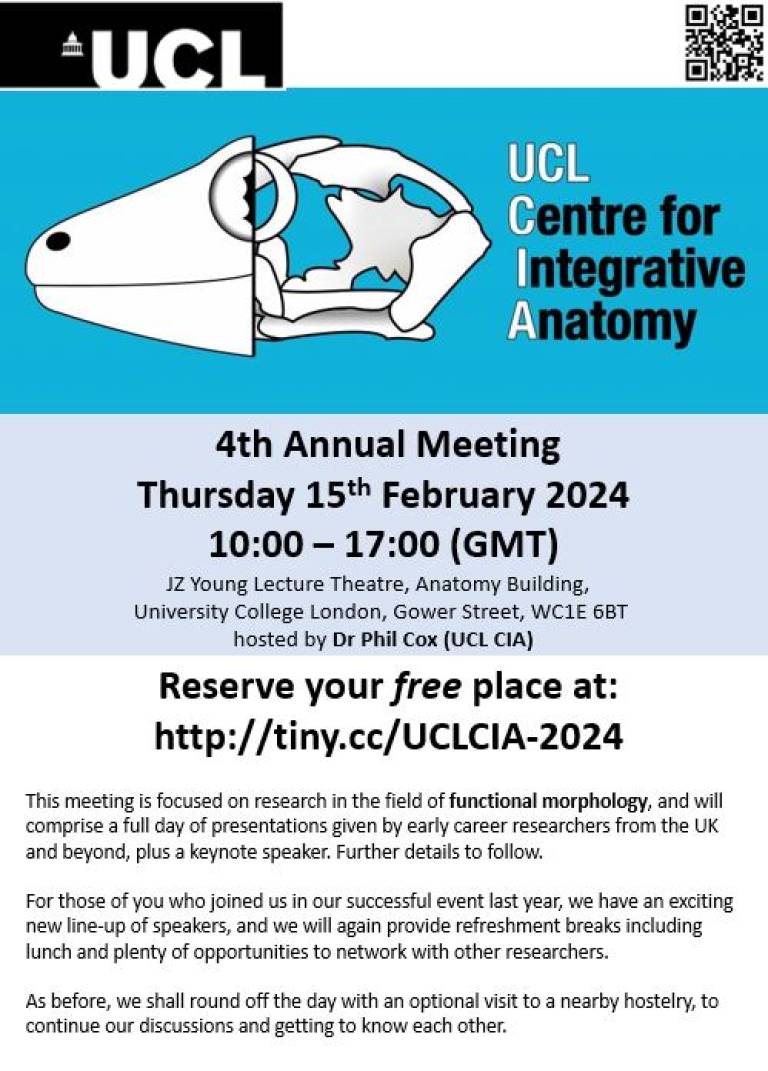Update on UCL Centre for Integrative Anatomy's symposium on functional morphology - 15 February 2024
25 January 2024
We are delighted to report that we have now finalised our programme for UCL Centre for Integrative Anatomy's annual meeting on 15 February 2024. Nineteen speakers from around Europe will give short talks. Social & networking time is included. Spaces are now limited.

Providing a great opportunity for early careers researchers to discuss their work, members and close associates of the UCL's Centre for Integrative Anatomy (the Centre) have selected about 20 speakers to participate in next month's all-day meeting in London, UK. Between them, UCL scientists will be contributing at least a dozen presentations, together with half a dozen from guests from around Europe; most will be 15-minute talks, but about six will be 5-minute 'flash' speeches.
Dr Phil Cox (Associate Professor, Anatomy) will be hosting the day, the formal part of which will close with a keynote talk by Dr Dominique Adriaens of the University of Ghent. As the programme has two refreshment breaks and a longer lunch break (food & drink included), plus an invitation to re-gather at a local hostelry afterwards, there will be plenty of opportunities to discuss the talks and other research, and generally to socialise.
The up-to-date, full timetable is below:
As the schedule shows, this annual symposium, the 4th to be held so far, has a functional morphology theme. Our aim is to allow as many to speak as possible, with slots limited to either 15 minutes or 5 minutes. Talks will cover a range of topics, where we look at the anatomy of both living and fossil animals, and see how the function that various body structures can perform is influenced by their physical shape and attachment to other body parts - and vice versa.
We also look at the development of these relationships over evolutionary time, and use many interesting techniques, involving the most up-to-date scanning and microscopy equipment (with their associated data analysis methods) to draw inferences.
Not only is this work of intrinsic interest, but what we find out has some very important uses, not least in healthcare and the medical sciences, with significant inputs to bioengineering and surgery, for example.
Within the functional morphology theme, the topics covered will be exciting and diverse, ranging over: birds (including bird brains); tetrapods, lagomorphs (rabbits, hares), rodent brains, fossil and extant squamates (reptiles, lizards), crocodiles; human bones, including the primate pelvis, mammalian scapulae (shoulder blades), carnivorean bacula (penis bones); island giants and - at the other end of the size spectrum - ants; plus segmentation techniques, to name but a few of the topics on offer.
If you would like to find out more, hear some short talks on functional morphology, meet some current experts in the field, and network and discuss various matters (over refreshment breaks, lunch and in a local hostelry afterwards!) registration is free to anyone, here: http://tiny.cc/UCLCIA-2024 or via the QR code above.
Follow us on LinkedIn or X/Twitter for updates, and individual speaker details and more talk/topic information.
For the location, see the map below; the street address is: UCL Centre for Integrative Anatomy, Anatomy Building, Gower Street, London WC1E 6BT.
The talks will be given in the JZ Young Lecture Theatre, which is room G29 on the ground floor, to the right of the entrance foyer. Refreshments (including vegetarian and vegan options) will be available in the Gavin de Beer Room, G04, just opposite. There is wheelchair access, please contact us to ensure. Further information is on the Eventbrite page used for registration/booking, which is essential (health & safety). The hostelry for after the meeting closes is at The Prince of Wales Feathers and you will be guided to 8 Warren St, Greater, London W1T 5LD (7-minute walk).
 Close
Close

